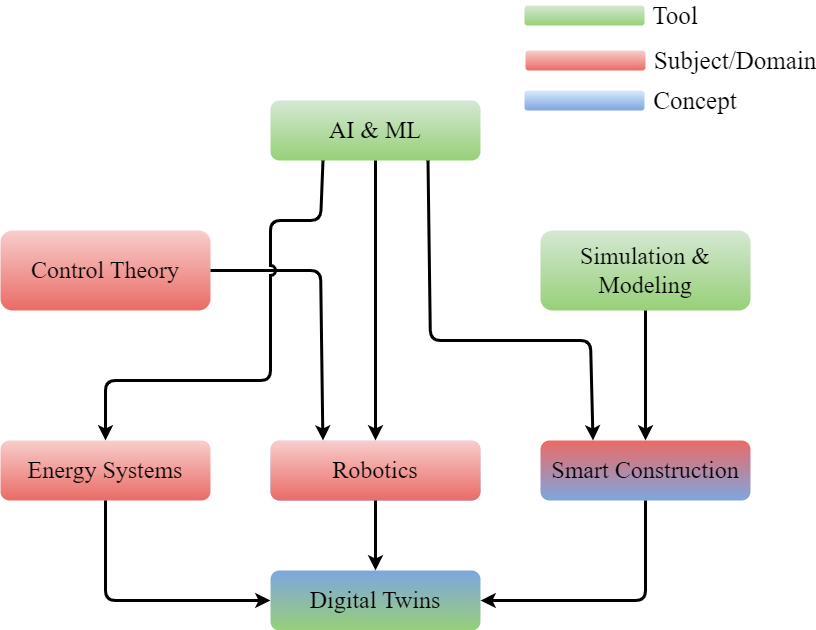Research Agenda
🚀 Research Intent
I am an engineer and researcher passionate about applying intelligent systems to real-world challenges in energy, automation, and infrastructure. My academic and professional journey has been driven by a focus on control systems, computational optimization, and simulation-based decision-making — all aimed at developing technologies that are useful, efficient, and adaptable. I approach research as a continuous process of implementation, refinement, and learning, with a deep desire to contribute meaningful, real-world solutions through engineering and applied research.
🔍 Research Vision
My research is grounded in a simple principle: technology should serve people and systems should adapt to the real world — not the other way around. I am interested in building intelligent systems that are efficient, responsive, and grounded in the practical realities of engineering and energy use.
As an engineer trained in computational intelligence, control systems, and simulation, I’m drawn to problems where decision-making needs to be both automated and adaptive — where uncertainty, scale, or competing objectives make conventional methods fall short. My early work in Building Energy Management Systems (BEMS) introduced me to these kinds of challenges, and I’ve since become increasingly interested in how similar principles apply to broader domains like smart infrastructure, assistive technologies, and autonomous control.
I believe impactful research is achieved through curiosity, consistency, and collaboration — where technologies are thoughtfully designed and implemented to meet real-world needs.
The through-line in my research is a commitment to bridging simulation and intelligence — building systems that can learn, adapt, and serve meaningfully.
How can we make complex models more efficient and usable for real-world deployment?
How do we ensure our tools serve people — not just systems?
I don’t approach these questions as a theorist alone. I am an engineer first — and I find purpose in building tools, testing methods, and refining ideas that contribute to practical, scalable solutions. Whether through simulation frameworks, energy models, or adaptive control strategies, my goal is to contribute to technologies that are both intelligent and implementable.

In the long term, I want my work to support sustainable design, empower collaborative human-machine systems, and enable smarter decisions in high-impact domains.
⚙️ Core Research Commitments
⚡ Intelligent Energy Systems
My research began with a focus on energy optimization in smart buildings — environments that require a balance between occupant comfort and energy efficiency. During my PhD, I applied Evolutionary Algorithms (EAs) and other Computational Intelligence techniques to Building Energy Management Systems (BEMS), integrating simulation platforms like EnergyPlus™, MATLAB®, Simulink®, and Simcenter FloVENT™.
This work introduced me to multi-objective optimization, simulation-based control, and the value of building systems that can learn and adapt to changing conditions. It also highlighted the need for tools that are accessible to engineers and practitioners — not just researchers. In response, I began developing a GUI-integrated framework that connects Python™ with EnergyPlus™, making the experimentation process more intuitive and scalable.
I’m especially interested in the role of surrogate modeling in making these systems more computationally efficient and responsive to real-world constraints.
🧠 Applied AI for Human-Centered Systems
I am increasingly interested in the application of AI and control theory to support systems designed around people — not just processes. While I have not yet worked directly in assistive robotics or physiological signal processing, I am actively exploring how reinforcement learning and multimodal sensing could support the development of adaptive, human-aware technologies.
This includes interfaces and machines that respond to bio-signals (e.g., EEG, EMG), learn from user behavior, and make real-time adjustments to improve safety, usability, and responsiveness. I see this as a space where engineering, AI, and empathy intersect — and where collaboration across disciplines will be essential.
🏗️ Digital Twins and Infrastructure Intelligence
My work in energy modeling and control naturally leads into digital twin technologies — virtual representations of real systems used for monitoring, optimization, and decision-making. While I am early in this space, I am particularly interested in the intersection of digital twin platforms and smart construction systems.
Having worked with simulation, visualization (GUI), and data integration, I aim to help develop digital environments that reflect physical processes in real time, enabling better forecasting, risk analysis, and resource planning. I am also exploring immersive technologies like AR/VR and their potential to support interaction with digital twins in design and operations — an area I am committed to learning and growing into.
🤖 Adaptive and Autonomous Systems
As control systems become increasingly intelligent, the boundary between automation and autonomy continues to blur. I am drawn to this frontier — where learning-based control meets real-world complexity.
My current goal is to expand my knowledge in nonlinear control, reinforcement learning, and predictive modeling, particularly as they apply to robotics and autonomous systems. While my experience to date is rooted in energy systems, I see this domain as a powerful extension of what I already understand: how to design systems that act under uncertainty, adapt in real time, and learn from their environment.
In the long term, I hope to contribute to frameworks that support safe, scalable autonomy in domains ranging from building automation to field robotics.
📌 Current Focus
- Exploring reinforcement learning for adaptive control systems
- Investigating surrogate modeling techniques to improve simulation efficiency
- Studying the design and deployment of digital twin platforms
- Learning to integrate immersive technologies with control and simulation tools